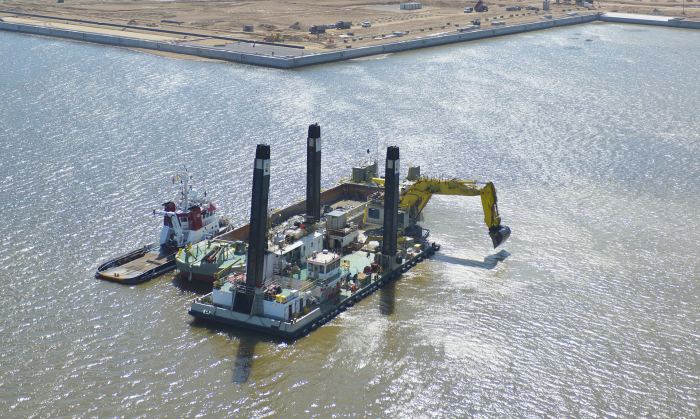New city, new horizon, new future
Boskalis is working in South Korea on the expansion of the futuristic Songdo City. “The language barrier was a particular challenge.” Project manager Tako de Veth and regional manager Neil Haworth explain: “We emphasized team building.”
What were the client’s reasons for appointing Boskalis for this work?
Tako: ”Fast, safe and efficient working is important in South Korea. The fact that we have an excellent track record in the field of efficiency and safety certainly helped us to win this assignment. An important condition was that we had to get a trailing suction hopper dredger on location very quickly.” Neil: “Boskalis generally opts for more thorough preparations but it is one of our company’s strengths that we can also switch fast. To avoid losing time, we suggested mobilizing a trailing suction hopper dredger, the Oranje, from a project in the Middle East and to do the work using Korean pipelines initially. That meant we could start straightaway and the client very much appreciated our flexible approach.”
What can you tell us about the scope of the project?
Tako: “The work involved extending and deepening five entrance channels and the harbor basins of the city of Incheon and using the dredged material (23 million m3) as the basis for the extension of ‘Songdo City’ in three major land reclamation operations. The project represented almost one and a half years of work for the Oranje. The hopper pumped the material to the reclamation area through a pipeline (with some floating sections) covering an impressive distance of six kilometers.”
the client very much appreciated our flexible approach
What were the specific challenges for the team in South Korea?
Tako: “As a globally-operating company, we are used to working in a range of countries and cultures. But the language barrier in South Korea was more of a challenge than usual. Very few people here speak English. So we depended on interpreters during our contacts with the clients and subcontractors. The work was directed from our branch in Singapore. We had a relatively small local organization that also included a number of Korean staff who spoke reasonable English. They played a crucial role. For example, one of our site coordinators was an enormous help clearing up communications with our client, the suppliers, the subcontractors and the people working on the sandfill.”
Solidarity
Tako continues: “We emphasized team building. Many of our team members tried to talk a little bit of Korean themselves and Korean staff did their best to improve their English. That creates a bond. One of the nice developments was that all the team members, from the top to the bottom, together with employees from the client and the subcontractors, kicked off the working day together with morning exercises. That wasn’t just good for our fitness levels, it also established a team spirit. Later, we had brief toolbox meetings on a daily basis. We also got the interpreters involved with the introduction of NINA, the Boskalis safety program. We worked together with our SHE-Q manager to develop a way of communicating the most important NINA topics. We had our ‘NINA Values & Rules’ translated into Korean and our subcontractor’s staff successfully completed our NINA ‘Do-it’ training. That allowed us to maintain high safety standards. The culture in Korea certainly doesn’t encourage all employees to talk to managers about safety behavior but we have achieved a lot in that respect.”
Our team was proud to be involved in such an impressive development
Tidal variation
Neil: “The structure of the seabed was challenging, too. To ensure that we removed only the required material from the seabed, we engaged in ongoing intensive surveys that allowed us to provide the trailing section hopper dredger with a constant flow of real-time information. Their work wasn’t made any easier by the enormous difference between high and low tides of nine meters, a factor that also made it particularly difficult to couple the vessel to the floating pipeline. Nevertheless, the Oranje performed better than expected and we actually completed our work ahead of schedule.”
Songdo City has been described as one of the most futuristic cities in the world. How did the team feel about contributing to that?
Neil: “South Korea is a global player due to its shipyards, heavy industry and its involvement in the large-scale production of cars and high-tech products. Incheon, on the Yellow Sea, is the main port of the capital, Seoul. We have established the basis for the extension of the harbor so that the largest ships in the world can be accommodated here in the future. At the same time, we put down the foundations for the extension of Songdo City, which is selling itself as one of the most sustainable cities in the world. Large numbers of international companies are expected to locate here. That is being emphasized by the United Nations, who have selected Songdo City as the location for the head office of the UN Green Climate Fund. We have put the concept of Creating New Horizons into practice literally here, and that was a privilege. Our team was proud to be involved in such an impressive development.”
